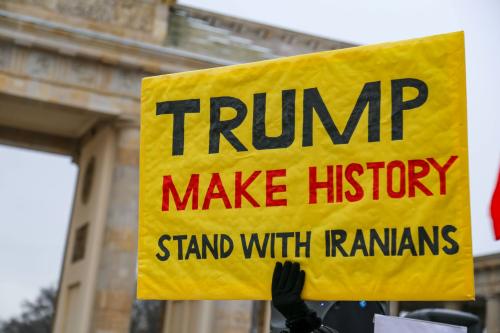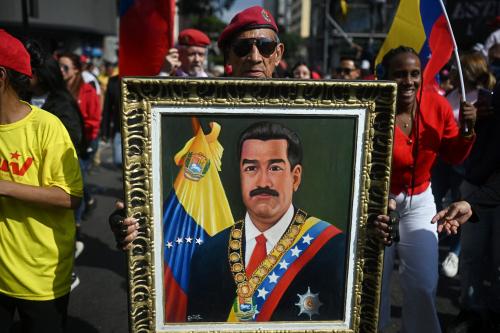Content from the Brookings Doha Center is now archived. In September 2021, after 14 years of impactful partnership, Brookings and the Brookings Doha Center announced that they were ending their affiliation. The Brookings Doha Center is now the Middle East Council on Global Affairs, a separate public policy institution based in Qatar.
In a surprising and controversial move, the U.S. Commission on International Religious Freedom (USCIRF) in its 2012 Annual Report released on Thursday recommended that the U.S. State Department categorize Turkey as a “Country of Particular Concern” (CPC) for religious freedom, a category reserved for the worst such as Iran, China and Saudi Arabia.
This claim should be taken with a grain of salt since five of the commission’s nine members and the State Department, which has the final say, have already distanced themselves from the report’s conclusion about Turkey. If not as a result of a bureaucratic glitch, Turkey’s inclusion in the suggested list of CPCs shows the power of the anti-Turkey lobby in the capital. The Turkish government vehemently, and rightly so, rejected the report’s characterization of religious freedom in Turkey.
Despite my skepticism over how the report characterizes religious freedom in Turkey and its overall conclusion, there is also some truth to it. Certainly, Turkey does not belong in the same category as Iran, China and Saudi Arabia when it comes to religious freedom. Unquestionably, the lot of Christians in Turkey has improved under the Justice and Development Party (AKP). But it is not enough; the government has done little to genuinely care for and help Turkey’s Christians maintain a dignified presence in Turkey.
Sadly, Christianity is endangered in Turkey. What used to be a large and vibrant Christian community has now been reduced to one-tenth of 1 percent of the population over the past century. Growing up in the historically Christian neighborhood of Kurtuluş, Istanbul (only two to three miles from Kasımpaşa where the prime minister grew up), I have witnessed the disappearance of Christians from Turkey. This historically Christian quarter has been “Turkified” since the 1930s. Its original name, Tatavla, was changed to Kurtuluş (independence) to honor the Independence War and to remind Kurtuluş’s residents — then mostly Greek Christians — that they lost the war.
Resettling Tatavla with Muslim residents
The name change came after the burning of a significant portion of the neighborhood in 1929. The municipality did little to stop the fire and used the rebuilding as an opportunity to resettle the neighborhood with Muslim residents. Subsequent waves of attacks and discrimination against Christians (wealth tax of 1942; September 6-7, 1955 mob attacks on non-Muslim shops; the intensification of the Cyrus problem; and the conflict over the Aegean Sea) resulted in Greeks fleeing Turkey in large numbers, turning Kurtuluş into a Muslim-majority neighborhood in the 1960s.
My family unwittingly contributed to the Islamization of the neighborhood. When my father bought a house in Kurtuluş in 1977 in order to move my family to Istanbul from eastern Turkey, a Greek eager to migrate to Greece sold it to him. Not all Greeks were able to sell their homes, however; many simply abandoned them, leaving the neighborhood full of empty or illegally occupied houses. I do not know the exact statistics, but my street-soccer team consisted of eight Muslims and five Christians (Greeks and Armenians). We came to recognize the difference in religion in the form of the colored eggs we were given on Easter, and we returned the favor with sacrificial meat during the Feast of the Sacrifice (Kurban Bayramı) in which some Christian families would occasionally participate by sacrificing their own sheep or goat.
This pleasant picture of Christians doing their best to mix in with the new Anatolian neighbors was coupled with old Christians increasingly dying in their homes in isolation, the abandoned houses becoming decrepit and the overall spirit of the neighborhood’s Christians becoming broken and battered. Among my five Christian soccer mates, only one stayed in Turkey while three migrated to Europe and one committed suicide.
Despite the USCIRF charge, the conditions of Christians have actually been improving under the AKP. I could see this in one of my last visits to my neighborhood. My neighborhood church opened its long-closed gates; I saw people carrying their crosses and Santa Claus look-a-likes hanging on ladders outside of windows in high rises, and one day on a street corner I was even offered a copy of the New Testament.
Moreover, the AKP is not to blame for the most outrageous crimes against Christians the USCIRF lists, such as the murders of Catholic priest Father Andrea Santoro in 2006 and Armenian journalist Hrant Dink in Istanbul in 2007, as well as three employees of a Protestant publishing house in 2007. These crimes came from ultranationalist circles linked with the Turkish “deep state” forces within the security and military forces. Christianophobia is prevalent in parts of the Turkish state. During my military service in 2005, I sat and listened to a military colonel’s lengthy conspiratorial seminar to 3,000 men about how the US is using missionaries to Christianize and control Turkey and how the Greek Orthodox patriarch is collaborating with Greece to turn Istanbul into Constantinople.
For their part, mainstream Turkish pro-Islamic groups have treated Christians well. The Gülen community initiated some inter-faith meetings and the AKP government eliminated the most abusive treatment towards Christians such as ultranationalists’ harassment of them. Yet there is still more to be done, such as opening the Halki Seminary and returning all confiscated properties of Christian foundations, as well as providing more support to Christian schools and churches and rewriting history textbooks to recognize Christians’ contribution to Turkey.
We should protect Turkey’s Christians and foster the growth of their cultural and religious presence for several reasons. First, it is our duty towards this land, its history and people. Christianity is an integral part of our rich Anatolian fabric. Can we think of Istanbul without Hagia Sophia or Cappadocia without its underground churches? St. Paul of Tarsus belongs to Anatolia as much as Yunus Emre, Constantine as much as Fatih Sultan Mehmet, Santa Claus as much as Hodja Nasreddin and the Nicean Creed as much as Rumi’s Sufism.
Secondly, the protection of Christians is also demanded by the European Union. Turkey must fulfill EU demands in order to travel down the road to EU membership and also to support Turkey’s claims that European countries should protect the rights of Turkish minorities and combat Islamophobia.
Third, we owe this to Turkey’s religious minorities who have been discriminated against for far too long. These minorities, have been loyal citizens of Turkey since the establishment of the republic despite having their human rights and dignity violated, while struggling to save their culture and identity. More importantly it is the right thing to do. The Quran asks us to treat others well and so do all of the human rights treaties Turkey has signed.
The Brookings Institution is committed to quality, independence, and impact.
We are supported by a diverse array of funders. In line with our values and policies, each Brookings publication represents the sole views of its author(s).



Commentary
Op-edTurkey Should Do More to Protect its Christians
March 26, 2012